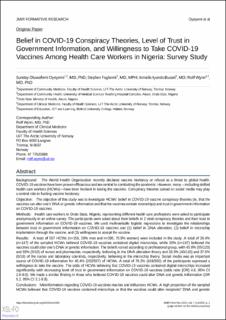| dc.contributor.author | Oyeyemi, Sunday Oluwafemi | |
| dc.contributor.author | Fagbemi, Stephen | |
| dc.contributor.author | Busari, Ismaila Iyanda | |
| dc.contributor.author | Wynn, Rolf | |
| dc.date.accessioned | 2023-07-18T08:49:28Z | |
| dc.date.available | 2023-07-18T08:49:28Z | |
| dc.date.created | 2023-04-17T19:57:33Z | |
| dc.date.issued | 2023 | |
| dc.identifier.citation | JMIR Formative Research. 2023, 7, Artikkel e41925. | en_US |
| dc.identifier.issn | 2561-326X | |
| dc.identifier.uri | https://hdl.handle.net/11250/3079682 | |
| dc.description.abstract | Background:
The World Health Organization recently declared vaccine hesitancy or refusal as a threat to global health. COVID-19 vaccines have been proven efficacious and are central to combatting the pandemic. However, many—including skilled health care workers (HCWs)—have been hesitant in taking the vaccines. Conspiracy theories spread on social media may play a central role in fueling vaccine hesitancy.
Objective:
The objective of this study was to investigate HCWs’ belief in COVID-19 vaccine conspiracy theories (ie, that the vaccines can alter one’s DNA or genetic information and that the vaccines contain microchips) and trust in government information on COVID-19 vaccines.
Methods:
Health care workers in Ondo State, Nigeria, representing different health care professions were asked to participate anonymously in an online survey. The participants were asked about their beliefs in 2 viral conspiracy theories and their trust in government information on COVID-19 vaccines. We used multivariable logistic regressions to investigate the relationships between trust in government information on COVID-19 vaccines and (1) belief in DNA alteration, (2) belief in microchip implantation through the vaccine, and (3) willingness to accept the vaccine.
Results:
A total of 557 HCWs (n=156, 28% men and n=395, 70.9% women) were included in the study. A total of 26.4% (n=147) of the sampled HCWs believed COVID-19 vaccines contained digital microchips, while 30% (n=167) believed the vaccines could alter one’s DNA or genetic information. The beliefs varied according to professional group, with 45.8% (55/120) and 50% (5/10) of nurses and pharmacists, respectively, believing in the DNA alteration theory and 33.3% (40/120) and 37.5% (6/16) of the nurses and laboratory scientists, respectively, believing in the microchip theory. Social media was an important source of COVID-19 information for 45.4% (253/557) of HCWs. A total of 76.2% (419/550) of the participants expressed a willingness to take the vaccine. The odds of HCWs believing that COVID-19 vaccines contained digital microchips increased significantly with decreasing level of trust in government information on COVID-19 vaccines (odds ratio [OR] 4.6, 95% CI 2.6-8.0). We made a similar finding in those who believed COVID-19 vaccines could alter DNA and genetic information (OR 5.2, 95% CI 3.1-8.8).
Conclusions:
Misinformation regarding COVID-19 vaccines reaches and influences HCWs. A high proportion of the sampled HCWs believed that COVID-19 vaccines contained microchips or that the vaccines could alter recipients’ DNA and genetic information. This might have negative consequences in terms of the HCWs’ own COVID-19 vaccination and their influence on other people. Lack of trust in government and its institutions might explain the belief in both conspiracy theories and vaccine hesitancy. There is a need for health care stakeholders in Nigeria and around the world to actively counteract misinformation, especially on social media, and give HCWs necessary scientifically sound information. | en_US |
| dc.language.iso | eng | en_US |
| dc.publisher | JMIR Publications | en_US |
| dc.rights | Navngivelse 4.0 Internasjonal | * |
| dc.rights.uri | http://creativecommons.org/licenses/by/4.0/deed.no | * |
| dc.subject | COVID-19 | en_US |
| dc.subject | vaccination | en_US |
| dc.subject | misinformation | en_US |
| dc.subject | conspiracy theories | en_US |
| dc.subject | health workers | en_US |
| dc.subject | Nigeria | en_US |
| dc.subject | government | en_US |
| dc.subject | information | en_US |
| dc.subject | threat | en_US |
| dc.subject | vaccine | en_US |
| dc.subject | willingness | en_US |
| dc.subject | genetic | en_US |
| dc.title | Belief in COVID-19 Conspiracy Theories, Level of Trust in Government Information, and Willingness to Take COVID-19 Vaccines Among Health Care Workers in Nigeria: Survey Study | en_US |
| dc.type | Peer reviewed | en_US |
| dc.type | Journal article | en_US |
| dc.description.version | publishedVersion | en_US |
| dc.subject.nsi | VDP::Medisinske Fag: 700::Helsefag: 800 | en_US |
| dc.source.volume | 7 | en_US |
| dc.source.journal | JMIR Formative Research | en_US |
| dc.identifier.doi | 10.2196/41925 | |
| dc.identifier.cristin | 2141436 | |
| dc.source.articlenumber | e41925 | en_US |
| cristin.ispublished | true | |
| cristin.fulltext | original | |
| cristin.qualitycode | 1 | |

